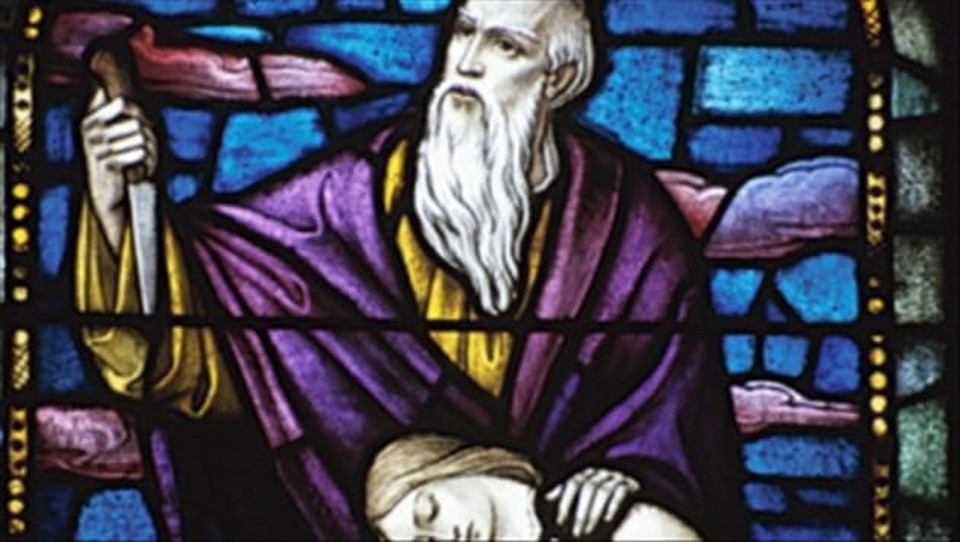The Sacrifice of Isaac: Was Abraham a Fanatic?

The contested interpretation of Old Testament passages rarely makes the pages of the nation's leading newspapers, but The Chicago Tribune recently looked at the interpretation of Genesis 22 -- the passage about Abraham offering up Isaac.
Religion reporter Manya A. Brachear suggests that the story of Abraham obeying God by offering up his son Isaac as a sacrifice is troubling and "a hard sell." It seems that some people find the account to be morally suspect.
The immediate context of the article is the fact that this account is a featured part of the Jewish New Year observance. Brachear asked several rabbis how they interpret the passage and teach it to their congregations.
As she reports:
On Rosh Hashanah, many rabbis struggle to inspire their audiences with one of the Bible's more chilling tales: Abraham, father of the Jewish people, bound his beloved son Isaac to an altar, raised a knife and prepared to kill him simply because God told him to do it. Although an angel stopped the slaying and pointed out a ram to take Isaac's place, Abraham is hailed as a hero for yielding to God's heartbreaking demand. The biblical story is a centerpiece of the Jewish New Year celebration, serving to remind Jews that God blesses those who submit to a divine calling without question.
Some find in the account evidence that Abraham was, at base, a religious fanatic. Rabbi Ellen Dreyfus of B'nai Yehuda Beth Sholom said: "In a way it's kind of a horror story. ... In our state of mind, if somebody hears a voice and goes out to sacrifice his son this man has to be put in a mental asylum."
So Rabbi Dreyfus sees the story as evidence that Abraham was delusional -- a candidate for a mental asylum. Another synagogue held a mock trial of Abraham for attempted manslaughter. He was found not guilty by a narrow margin.
Brachear reported that several rabbis felt that the story, if read in the service, would offend about half of their congregations.
Others found the story to be about religious extremism, child abuse, or fanaticism. Rabbi Eitan Weiner-Kaplow of Shir Hadash Reconstructionist Synagogue explained: "In reading this story we recognize the critical lesson is that God does not want the death of human beings as a sign of faith and a sign of doing God's will. Therefore the lesson for this time has got to be, we all have to come together to end war and stop the violence and stop the sacrifice and stop the killing."
At least some included in The Chicago Times article got closer to the truth:
As Rabbi Michael Sternfield of Chicago Sinai Congregation read the Scripture from the Torah scrolls Thursday, Sara Beugen passed her mother, Joan, a note. "What would you do if you were Abraham?" Sara scrawled in pencil. "If you devoted your whole life to conceptualizing and understanding a singular God, and God called you to do something, no matter how reprehensible, would you not do it?" her mother said later. "You'd believe in your heart of hearts he would make it right and would not let it happen."
For Christians, the authoritative interpretation of the passage comes in Hebrews 11, where we are told that the entire episode was intended to test Abraham's faith and to demonstrate God's faithfulness.
As Hebrews 11:17-19 reveals:
By faith Abraham, when he was tested, offered up Isaac, and he who had received the promises was in the act of offering up his only son, of whom it was said, "Through Isaac shall your offspring be named." He considered that God was able even to raise him from the dead, from which, figuratively speaking, he did receive him back.
The book of Hebrews teaches that Abraham was being tested, and that his own faith in God was evident in his binding of Isaac. At the same time, we are also told that Abraham trusted God. The same God who has promised Abraham that he would be the father of a great nation would also be able to protect Abraham's son -- or even raise him from the dead.
Abraham was also confident that God would make a provision for him and even for the necessary sacrifice. Of course, God provided a ram. Christians know that this ram represents Christ.
The controversy should remind Christians to study the Old Testament with dedication -- and it should also remind us that Christians are also dependent on the New Testament's interpretation of the Old Testament.
The image atop the article is Caravaggio's "The Sacrifice of Isaac," 1598.
© All rights reserved, www.AlbertMohler.com. Used with permission
Originally published September 21, 2007.





